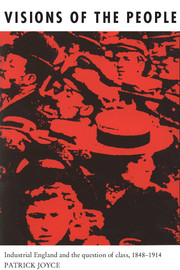Book contents
- Frontmatter
- Contents
- List of plates
- Acknowledgements
- 1 Introduction: beyond class?
- PART I POWER AND THE PEOPLE: POLITICS AND THE SOCIAL ORDER
- PART II MORALISING THE MARKET: WORK AND THE SOCIAL ORDER
- PART III CUSTOM, HISTORY, LANGUAGE: POPULAR CULTURE AND THE SOCIAL ORDER
- 6 Custom and the symbolic structure of the social order
- 7 The sense of the past
- 8 The people's English
- PART IV KINGDOMS OF THE MIND: THE IMAGINARY CONSTITUTION OF THE SOCIAL ORDER
- Appendices
- Bibliographical note
- Notes
- Index
7 - The sense of the past
Published online by Cambridge University Press: 05 March 2012
- Frontmatter
- Contents
- List of plates
- Acknowledgements
- 1 Introduction: beyond class?
- PART I POWER AND THE PEOPLE: POLITICS AND THE SOCIAL ORDER
- PART II MORALISING THE MARKET: WORK AND THE SOCIAL ORDER
- PART III CUSTOM, HISTORY, LANGUAGE: POPULAR CULTURE AND THE SOCIAL ORDER
- 6 Custom and the symbolic structure of the social order
- 7 The sense of the past
- 8 The people's English
- PART IV KINGDOMS OF THE MIND: THE IMAGINARY CONSTITUTION OF THE SOCIAL ORDER
- Appendices
- Bibliographical note
- Notes
- Index
Summary
Given the very nature of oral means of transmitting and constructing the past, there is much in the popular historical sense which is for us unknowable. Nonetheless, there are various ways of approaching it. Even though they go in part through the unrepresentative route of self-educated working people, David Vincent's studies of popular autobiography and of literacy and popular culture are revealing. He has shown how autobiographers drew on a rich and vital store of private oral histories, circulating within as well as concerning families and communities. Such histories were by no means solely oral, but sometimes drew upon a popular print culture apparent in chapbooks and ballads. Quite clearly, the idea of an ‘oral culture’ is a misnomer to the extent that it fails to register the centuries-old symbiosis of oral and printed forms of communication, an association particularly close in Britain and western Europe.
When applied to these ‘histories’ perhaps the term history is another misnomer. Vincent indicates that they served the needs of the present, very much in the key of custom. They served to amuse, to intimidate and instruct new generations, and to console or edify older ones. These functions are evident enough in the history which writing and print made possible, but the differences between this and oral histories are clear enough. Contemporary consideration of ‘popular memory’ shows this selectivity and utility at work in present oral culture as well.
- Type
- Chapter
- Information
- Visions of the PeopleIndustrial England and the Question of Class, c.1848–1914, pp. 172 - 192Publisher: Cambridge University PressPrint publication year: 1991



